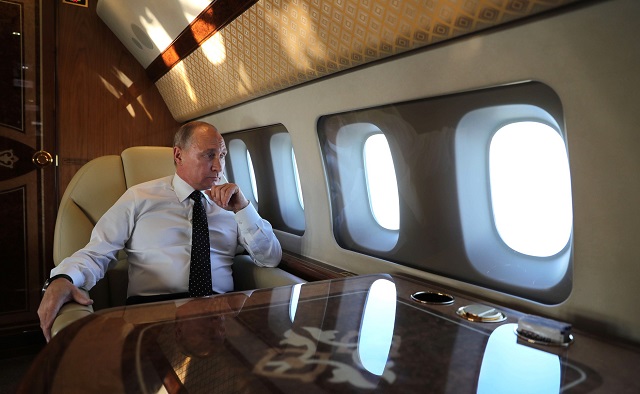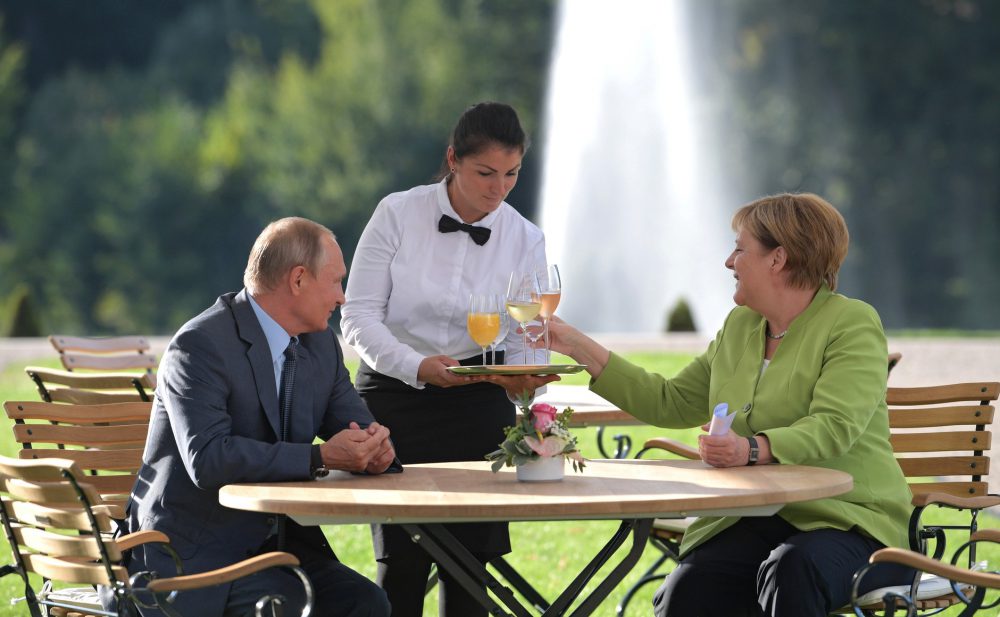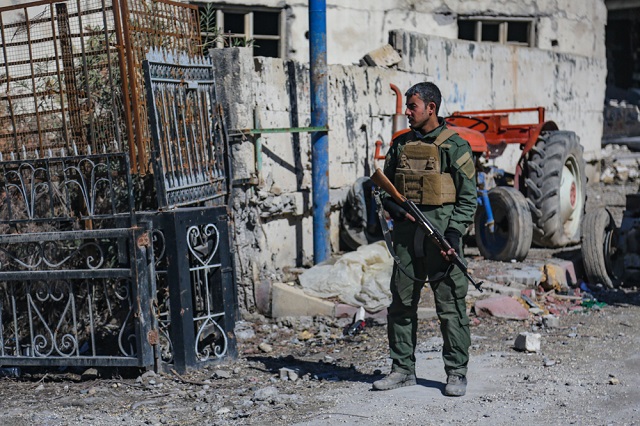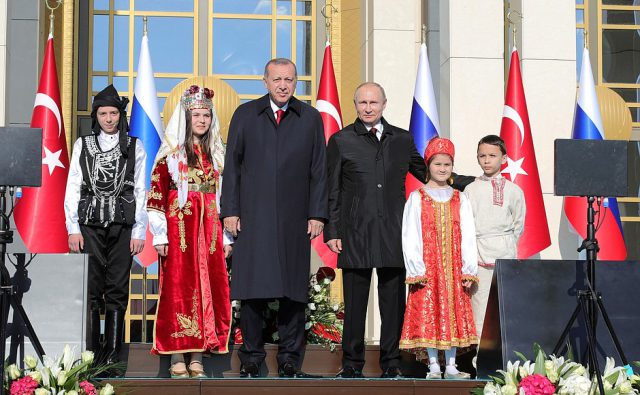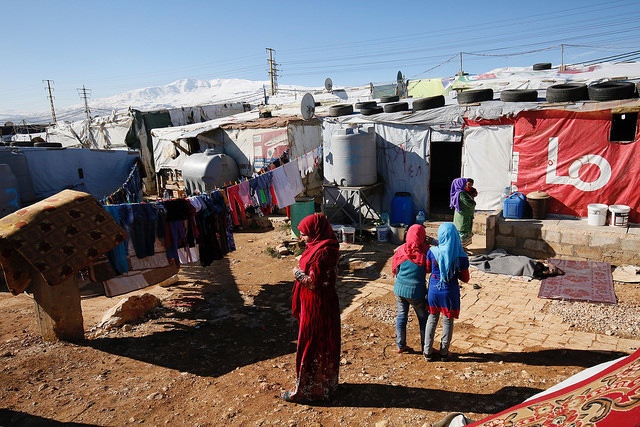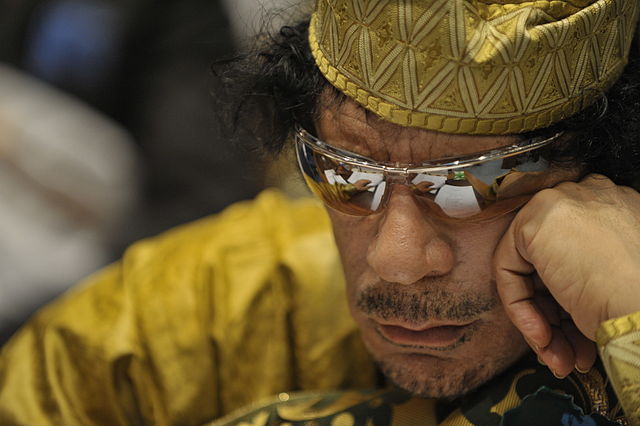
The missile strikes against Syrian military installations that the United States, the United Kingdom and France recently carried out, in response to the government’s apparent use of chemical weapons in the rebel-held town of Douma, have once again raised the question of when the use of force against a sovereign state is permissible. The contexts vary. Countries might use force to wage a defensive war, to exercise the ‘responsibility to protect’ against genocide or other crimes against humanity, or to prevent the acquisition or use of weapons of mass destruction. But the question is always the same: When is it right to fight?
There will always be interested parties or international lawyers contesting individual cases. Yet, among policymakers and those who advise them, there is more international consensus on the appropriate use of force than meets the eye. Spelling out the scope and limits of that consensus may help to clear the ground, both for the current debate about Syria and for debates about future cases.
At least since the controversy over NATO’s military intervention in Kosovo in 1999—in which the alliance bombed Belgrade, the Serbian capital, without authorisation from the United Nations Security Council—there has been widespread international agreement on three points. The first is that there is a difference between legality and legitimacy. The use of force can be legitimate without being technically legal; and it can be technically legal without being regarded by the world as legitimate.
The second point is that legality is determined by conformity with the provisions of the UN Charter—and only that. And the third point is that there are generally understood prudential criteria for legitimacy that enjoy widespread informal acceptance, even if they are not set in stone by any international treaty, UN Charter provision, or UN General Assembly or Security Council resolution.
Defining legality
As to legality, the UN Charter makes clear that the use of coercive military force in the territory of a sovereign state without its consent is permissible only under at least one of two conditions. The first is self-defence, as stated in Chapter VII, Article 51; the second is approval by the Security Council, as stated in Chapter VII and Chapter VIII (for cases involving the use of force by regional organisations).
In the case of self-defence, there is a longstanding debate over whether Article 51 allows for the use of force when an attack by another country is feared or threatened but has not yet occurred. To the extent that there is any consensus among international lawyers about ‘anticipatory self-defence’, as it is known, it is that the use of force is permissible when there is overwhelming evidence that an attack is imminent, provided that the response is proportionate. English allows for a neat distinction that is apparently unavailable in most other languages: acting preemptively is permissible, whereas acting preventively is not.
In cases where self-defence does not apply, the legality of a military intervention depends on Security Council approval, which can be vetoed by any of that body’s five permanent members: the United States, the United Kingdom, France, Russia and China. In the event, such vetoes can be, and often are, exercised for blatantly self-interested reasons, as Russia has clearly demonstrated in the case of Syria.
In the face of this frustration, there have been periodic attempts, particularly by US and UK government lawyers, to argue that there is an additional source of legal authority outside the UN Charter. According to this view, customary international law provides for military interventions launched in response to actual or threatened mass-atrocity crimes, particularly those involving nuclear, chemical or biological weapons.
But such arguments have no legs in the absence of significant international consensus. Ultimately, if you want a legal justification for military action, you must find it in the UN Charter.
Five tests of moral right
Putting aside legality, what principles determine the legitimacy of coercive military force? Though never formally endorsed by the UN or anyone else, five prudential criteria have become part of the general currency of international debate over the last two decades. Having originated in the 2001 report, The responsibility to protect, by the International Commission on Intervention and State Sovereignty, these criteria gained further traction in the report issued by the UN Secretary-General’s High-Level Panel on Threats, Challenges, and Change in the lead-up to the UN’s 60th anniversary summit in 2005. It is now very widely, if not universally, accepted that any use of military force must pass these five tests to be accepted as morally and politically legitimate.
The first hurdle is the seriousness of threat test. Is the threatened harm to state or human security of a kind, and sufficiently clear and serious, to justify prima facie the use of force?
Second, there is the proper purpose test. Is it clear that the primary purpose of the proposed military action is to halt or avert the threat in question, whatever other purposes or motives may be involved?
Third is the last resort test. Has every non-military option for meeting the threat in question been explored, with reasonable grounds for believing that lesser measures will not succeed?
This is followed by the proportional means test. Is the scale, duration, and intensity of the proposed military action the minimum necessary to meet the threat in question?
Finally, there is the balance of consequences test, which is probably the most important of all. Is there a reasonable chance of military action being successful in meeting the threat in question, with the consequences of action not likely to be worse than the consequences of inaction? In short, will a military intervention do more harm than good?
One of the main attractions of these criteria is that they are in no way culture- or religion-specific. Though they have an obvious pedigree in Christian ‘just war’ theory, which dates back to the early Middle Ages, they resonate equally, and are not at all inconsistent, with the world’s other major intellectual and religious traditions, including Islam, Judaism, Hinduism and Buddhism. Indeed, the Mahabharata, the great Hindu epic written centuries before the birth of Christ, offers one of the earliest discussions of a ‘just war’.
The hope is that, over time, these criteria will be applied ever more systematically by the UN Security Council and other policymakers making decisions about the use of force. To be sure, long before US President Donald Trump’s election, successive American administrations have been resistant to even informal restraints on their divine right to act as they please on the world stage. But if all parties to a decision to use force were to make good-faith efforts to address each prudential criterion with deeply considered, evidence-based arguments, then it would be reasonable to expect a consensus to emerge in the cases that warrant it.
From words to (in)action
The criteria for legitimacy also help us to analyse past interventions that remain contentious to this day. For example, the 2011 NATO-led intervention in Libya, in which Colonel Muammar al-Qaddafi was pursued all the way to the grave, raised serious questions about proportionality: arguably, force applied in pursuit of regime change exceeded what was necessary to meet the primary objective of protecting civilians from atrocities.
Conversely, the much-criticised decision not to intervene militarily in Darfur in 2003–2004 was amply justified by reference to the balance of consequences test. The conflict stemming from an intervention would have made it logistically impossible to maintain international humanitarian relief for more than two million displaced Darfuris; and the fragile North–South peace agreement, just barely holding together after 20 years of terrible conflict, would have become a dead letter.
The same criterion helps us appreciate why it could be right to intervene militarily in response to crimes against humanity in Sierra Leone or Côte d’Ivoire, but not in Russia or China, regardless of how badly those governments might behave in Chechnya or Tibet and Xinjiang. An intervention against a major power would mean full-scale war, with casualties and immiseration on a much greater scale than anything that could conceivably have been averted by such action.
This is not about double standards; it is about a realistic calculation of the balance of harm. During the eruption of violence in East Timor in 1999, for example, coercive military action against Indonesia would have been absolutely unthinkable. Only after the Indonesian government had agreed, under substantial international pressure, to allow for an external peacekeeping mission with a robust enforcement mandate did intervention become possible.
To take one final case, the criteria for legitimacy also help us articulate why it was right to invade Iraq in 1991, but not in 2003; and that would still be true even if the latter war had met all the criteria for legality—which, of course, it did not. In the First Gulf War, all of the stars were aligned—legally and morally—in favour of military action. On the legal front, Iraq’s invasion of Kuwait was an unequivocal breach of the UN Charter—and universally seen as such by the members of the Security Council.
As for legitimacy, the use of force that followed—though brutal, so far as it went—was clearly motivated by a proper purpose. It was driven by necessity, because diplomacy had failed to secure Iraq’s exit from Kuwait. It was proportional in its application, not least because the intervening troops stopped short of marching on to Baghdad once the rout from Kuwait was complete. And, in terms of the balance of consequences, the intervention did no more damage than it stopped.
Conflicting imperatives
Cases involving technically legal military action that is widely seen as illegitimate continue to arise, so it is worth asking what happens when legality and legitimacy come into conflict. Consider the NATO-led action in Libya in 2011. The US, UK and French intervention was initially endorsed by the Security Council. But the intervening powers lost international support as military operations wore on, because they were seen as having changed the focus of the operation from civilian protection to regime change.
Such cases do not raise difficult conceptual issues, but they can have dire political consequences. As a result of the Libya controversy, the Security Council consensus collapsed just when a similar situation was developing in Syria, where Assad’s forces were gunning down peaceful protestors in the streets.
Yet, more often than not, the conflict between legality and legitimacy runs in the other direction, such that an action widely seen as satisfying the criteria of legitimacy does not win Security Council authorisation, owing to an actual or threatened veto. Examples of this include NATO’s 1999 intervention in Kosovo and, arguably, the recent strikes against Syria. Many would say that legitimacy trumps legality in such cases. But in so doing, they pose a difficult dilemma for those of us who passionately believe in a rule-based international order.
That dilemma admits no simple solution. Still, I have found that the most persuasive and credible way of approaching the problem of morally compelling military action in the absence of formal legal authority is to think about it in terms of a ‘plea in mitigation’ in criminal court.
This is the kind of plea that a driver caught running a red light while his pregnant wife is about to have a baby in the back seat might make in court:
We acknowledge that we have breached the letter of the law, but we don’t challenge its applicability. And we won’t make a habit of it. It is just that in the very particular circumstances of this case, there was an overwhelming moral imperative to act as we did. Any censure should reflect that.
As such, he would ask that any sentence reflect those extenuating circumstances.
For this kind of argument to stand up in any particular international situation, the moral case must be very compelling indeed. In the case of the apparent chemical-weapons attack in Douma, the US, UK and French missile strikes were arguably justified by the horror of the indiscriminate methods used by Bashar al-Assad regime’s. There did not appear to be any other way of changing the regime’s behaviour, and the calibrated proportionality of the response has not triggered an even wider and uglier war, as many had feared.
Yet it would have been wiser to wait until unequivocal evidence emerged proving the Assad regime’s culpability. The Western allies’ failure to do so means that their appeal to the court of global opinion is much weaker than it otherwise might have been.
